
In our increasingly sex-positive culture, harsh judgements about premarital sex can seem oddly antiquated: Three-quarters of U.K. residents now feel there’s nothing wrong with having sex before getting hitched. Researchers attribute shifting attitudes on the subject to a mix of historical developments, including the success of the feminist movement, the broad availability of contraception, and recent generations marrying later in life. Whatever the complex causes, Europeans and Americans are now more likely to regard premarital sex as unremarkable than unacceptable – a sharp reversal of past “social norms.”
Yet, many modern individuals still choose to wait until marriage and do so for a wide range of reasons. If sex positivity emphasises comfort, consent, and empowerment, can the movement embrace the conscientious decision to abstain? What is sex like for those who wait until their wedding night, and how do they come to view their choice in hindsight?

To delve into these complicated and compelling questions, we surveyed 1,000 individuals in Europe and America about their experiences with sex before and after marriage. Seven hundred respondents engaged in premarital sex, whereas 300 decided not to do so. Our findings reveal a diverse array of motives for remaining celibate, interesting contrasts, and much common ground. To compare the experiences of those who wait and those who don’t, keep reading.
Intimate Alternatives
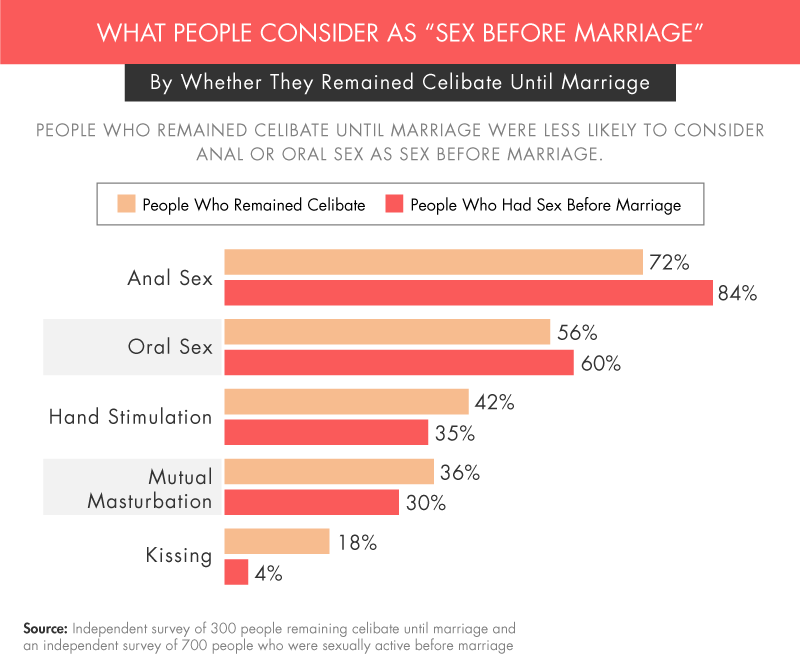
Before exploring premarital celibacy more closely, it’s worth asking what “waiting for marriage” actually requires. Most respondents felt kissing should not be deemed premarital sex, but other intimate acts prompted contrasting opinions. According to 64 percent of those who chose to wait and 70 percent of people who were sexually active, mutual masturbation (stimulation of oneself with a partner) should not count as sex before marriage. A slightly smaller percentage of each group said the same regarding hand stimulation of a partner – clearly, there isn’t a complete consensus as to the boundaries of premarital celibacy.
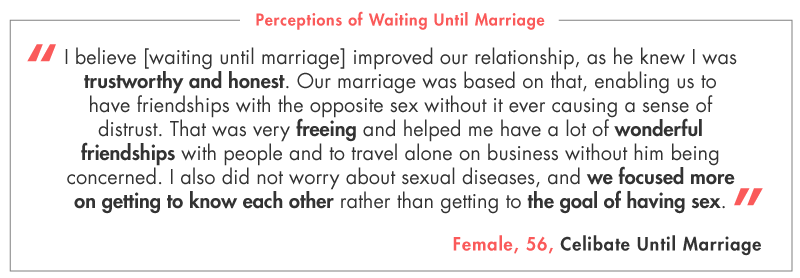
Most respondents did feel oral sex amounted to sex before marriage, however: Forty-four percent of those who waited, and 40 percent of those who did not, claimed otherwise. Furthermore, merely 28 percent of respondents who waited until marriage said anal sex did not qualify as premarital sex, as did 16 percent of people who chose not to wait. Interestingly, those who remained celibate until marriage were more likely to exclude oral and anal sex from their notions of premarital sex. Of course, each couple should feel empowered to define waiting on their own terms: Perhaps some who delay vaginal intercourse view oral or anal sex as enjoyable alternatives until they consecrate their marriage.
Celibacy and Satisfaction
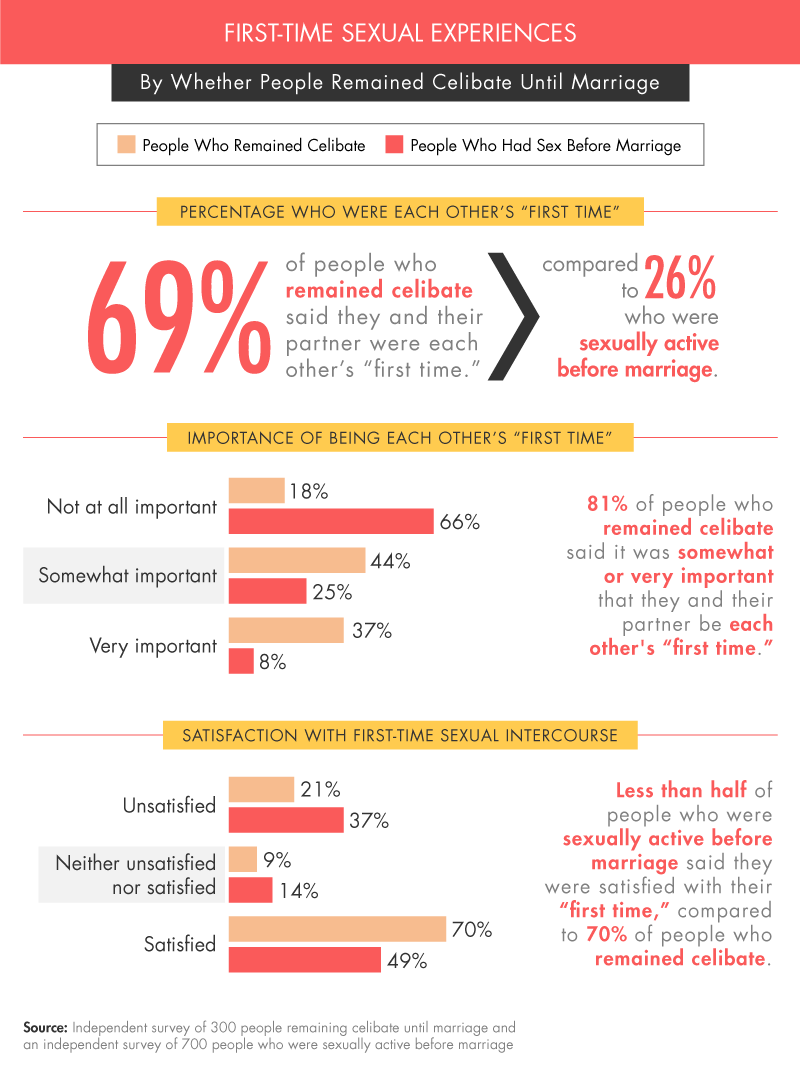
It’s important to remember that waiting until marriage doesn’t mean someone is necessarily a virgin. They may have had sex previously but still choose to wait until marriage in subsequent relationships.
Most who waited until marriage to have sex didn’t go it alone: Nearly 7 in 10 people who waited until their wedding night said it was their spouse’s first time as well. Among those who had premarital sex, however, just 26 percent said their first partner had never had sex before either. These findings seem to align with each group’s sentiments: 37 percent of individuals who remained celibate until marriage said it was very important that their partners did the same. Conversely, two-thirds of people who had premarital sex said it was not at all important that their first partner loses his or her virginity simultaneously.

Interestingly, those who delayed sex until after marriage were significantly more likely to find their first sex experience satisfying. This finding could be attributable to the connection between partners – and the relative maturity of married individuals. Presumably, a married couple is more likely to possess mutual trust that could make navigating first-time sex together more enjoyable. Conversely, many who have premarital sex do so for the first time as teenagers, when they may have less experience in caring communication with their partners. Of course, one could argue that the first time matters less than subsequent practice: Perhaps those who have premarital sex benefit from accumulated experience by the time they do reach their wedding nights.
Celibacy and Compatibility
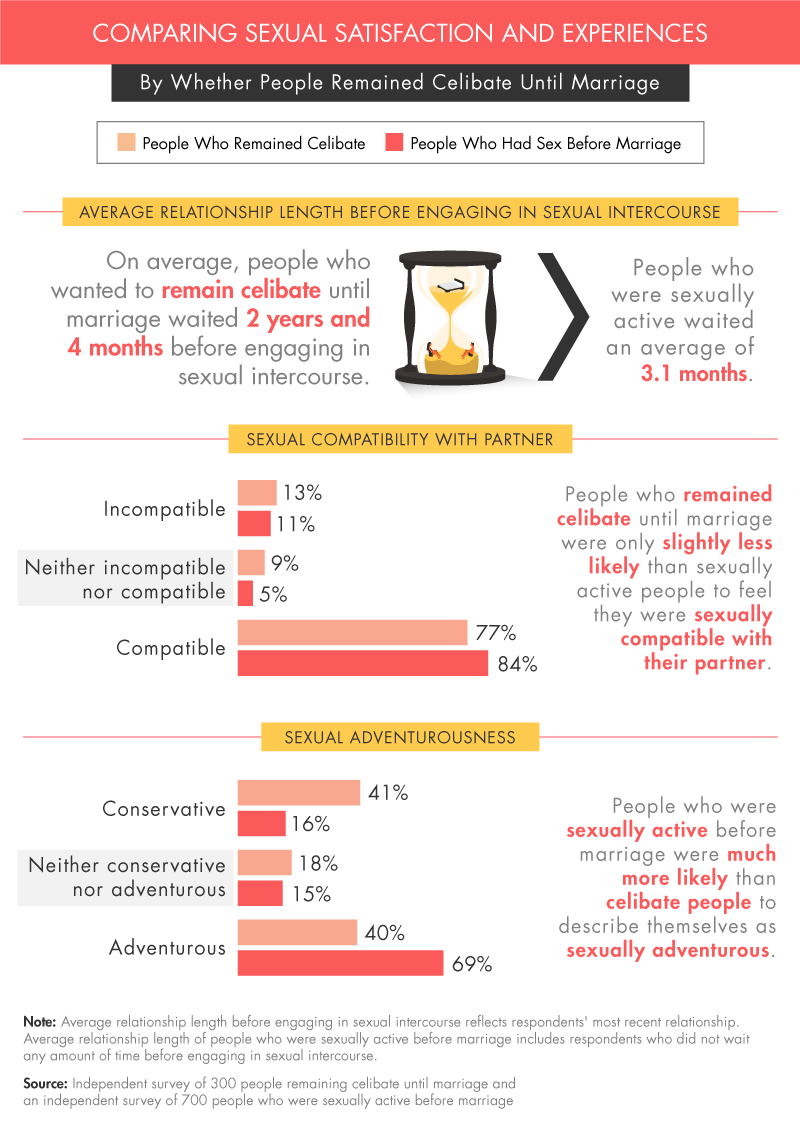
For those who decided to wait until marriage, that choice entailed delaying sex for more than two years on average before they could wed their partners. Individuals who had sex before marriage didn’t necessarily have sex with their significant others after a couple of dates, however: When asked how long they held off on intercourse in their most recent relationship, the average wait time was just over three months. Although that may seem like a long time to some, this finding speaks to the broad range of choices couples make about having sex or holding off. There’s no “normal” or “healthy” trajectory for physical intimacy: Even relationship researchers disagree sharply about the optimal time for intercourse between long-term partners.

Thankfully, individuals who delayed sex until after marriage usually discovered they were sexually compatible with their spouses – or at least grew to feel that way in time. In fact, they were only slightly less likely to feel sexually compatible with their partners than individuals who had sex before marriage. Our findings do suggest that those who had sex before marriage were more likely to view themselves as sexually adventurous, however. By contrast, a greater percentage of respondents who remained celibate until marriage described themselves as sexually conservative.
Reassessing in Retrospect
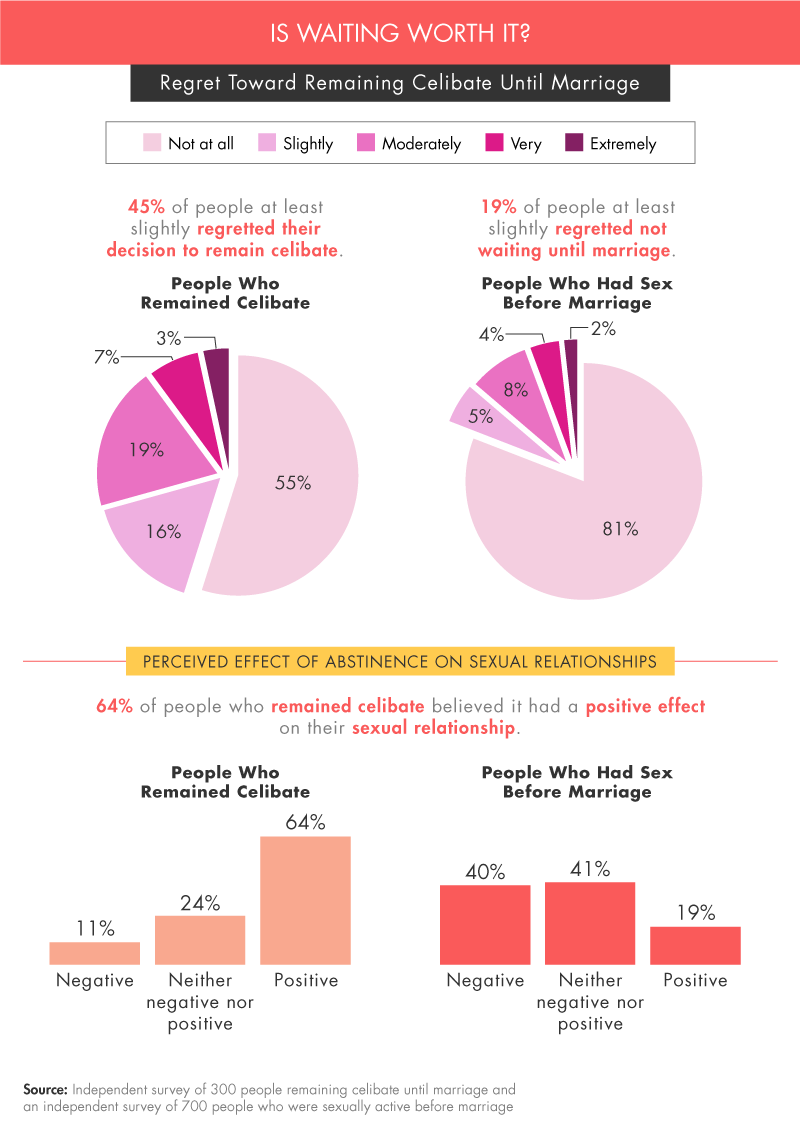
Most people who waited until marriage were happy with their choice in retrospect, but 45 percent expressed some degree of regret. Some who elected not to wait also expressed mixed feelings about their decision: Nearly a fifth wished they’d remained celibate until their wedding day. Reassessing our choices can be perfectly healthy, but it’s important not to adopt too critical a stance with regard to past experiences. Psychologists warn harsh self-judgements about sexual matters can become deeply painful, making intimacy challenging in future relationships.

Nearly two-thirds of those who remained celibate until marriage felt their decision positively affected their sexual relationship with their partner. As one might expect, those who had sex before marriage felt differently: Forty percent felt waiting would have a negative effect, and 41 percent said it would have a neutral impact. However you feel your past choices have influenced your sex life, improvement is possible in the present. Experts suggest simple changes can often improve sex for long-term couples, beginning with prioritising intimacy by creating time for it.
Reasons and Regret
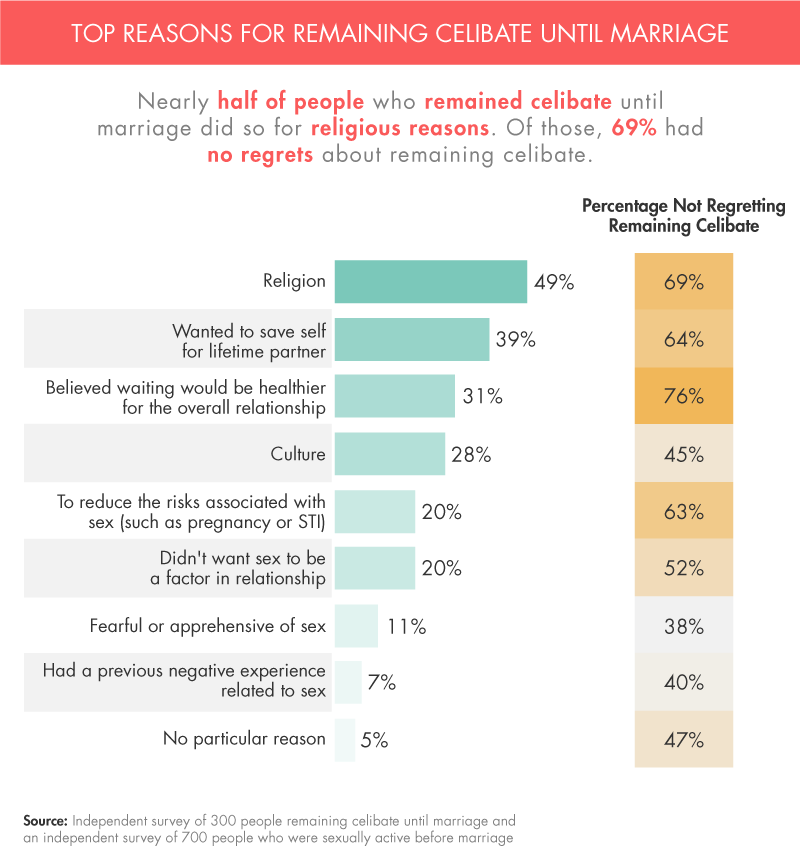
Nearly half of individuals who elected to wait did so for religious reasons, and those who expressed this motive for staying celibate were among the least likely to regret it. Wanting to save oneself for a lifetime partner was also a common reason, as was the sense that delaying sex would aid the relationship overall. In contrast to these personal convictions, 28 percent cited cultural pressures to remain celibate as well, although the majority of this group regretted their choice in retrospect.

In other cases, respondents cited a desire to avoid the possible outcomes of unprotected sex: 20 percent said they waited to avoid pregnancy or a sexually transmitted infection. Although STIs are relatively common, this motive for celibacy suggests a lack of access or familiarity with other birth control methods such as condoms. Sadly, 11 percent attributed their choice to wait to fear or apprehension about sex, and another 7 percent said a prior negative experience motivated them to delay sex. Individuals who expressed these feelings were more likely than not to regret their choice to wait until marriage.In other cases, respondents cited a desire to avoid the possible outcomes of unprotected sex: 20 percent said they waited to avoid pregnancy or a sexually transmitted infection. Although STIs are relatively common, this motive for celibacy suggests a lack of access or familiarity with other birth control methods such as condoms. Sadly, 11 percent attributed their choice to wait to fear or apprehension about sex, and another 7 percent said a prior negative experience motivated them to delay sex. Individuals who expressed these feelings were more likely than not to regret their choice to wait until marriage.
Free to Choose Your Timing
Our findings demonstrate an incredible range of opinions and experiences: On subjects as significant as sex and marriage, it’s no wonder we’ve uncovered feelings both personal and passionate. In reviewing these results, however, it’s important to reserve judgement about our differences – no matter which path we’ve selected for ourselves. Navigating the timing of intimacy can be challenging, even with the support of a loving partner. Each of us deserves to engage in love and sex in the manner that makes us comfortable – free from the criticisms of those who choose differently.
However your romantic life unfolds, you should never feel forced to compromise your well-being. Don’t let the impersonal and inconvenient aspects of traditional medical care prevent you from accessing the help you need. With Superdrug Online Doctor, you can access swift and confidential health care on your terms. Learn more about our services today and see how much easier staying healthy can be.
Methodology
We collected responses from 700 people who were sexually active and didn’t wait until marriage before engaging in sexual intercourse and 300 people who currently or previously waited until marriage before engaging in sexual intercourse. Fifty percent of people who both waited and did not wait until marriage were from the U.S. and the other 50 percent were from Europe. Fifty-four percent of participants were men, 46 percent were women, and less than 1 percent identified as a gender not listed in our survey. Participants ranged in age from 18 to 76 with a mean of 35 and a standard deviation of 10.9.
The data we are presenting rely on self-reporting. There are many issues with self-reported data. These issues include but are not limited to the following: selective memory, telescoping, attribution, and exaggeration. It’s possible that with a larger sample size of people who remained celibate until marriage, we could have gained more insight into this demographic.
Fair Use Statement
If you’d like to share our project with your own online audience, you’re welcome to do so for noncommercial purposes. If you do, please provide a link to this page to attribute our team for our efforts. Questions or concerns? Please email any comments to [email protected].